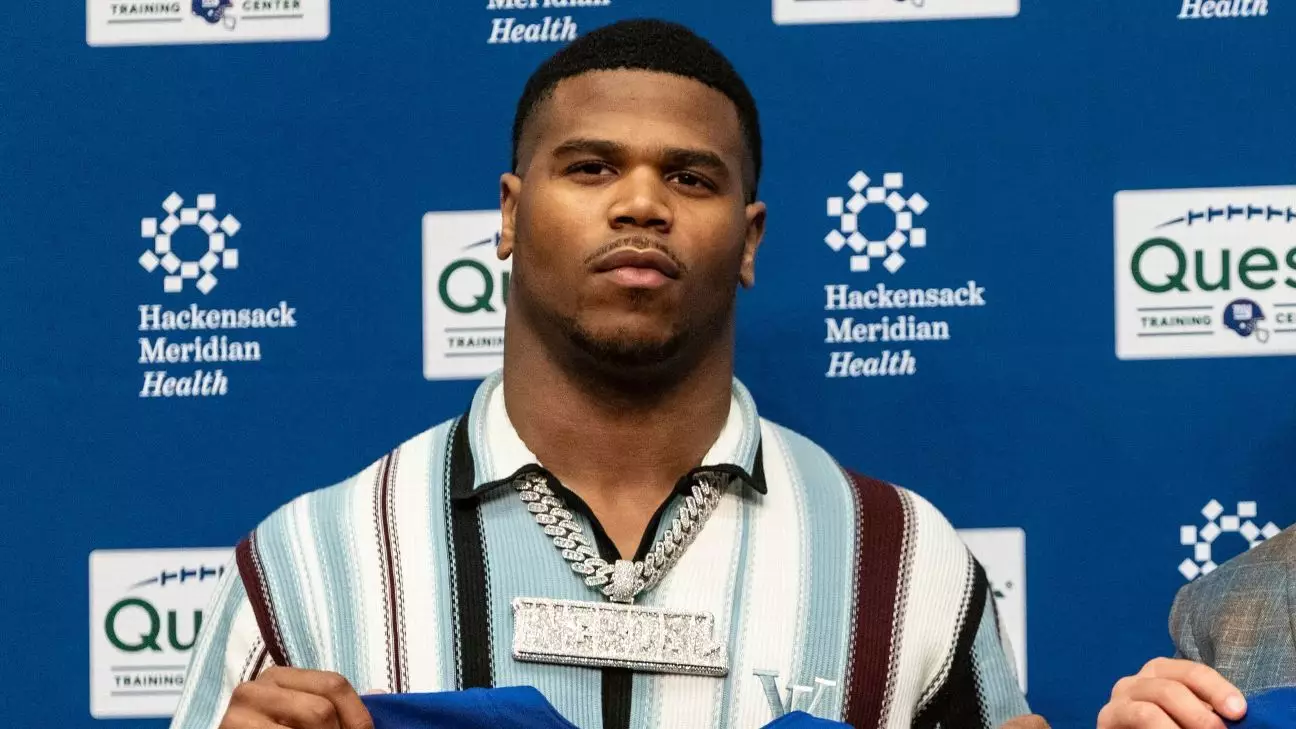When a young athlete like Abdul Carter transitions into the professional realm, the choices laid before them can feel monumental, even monumental in the most mundane of details—like selecting a jersey number. For Carter, a third overall pick in the NFL draft by the New York Giants, choosing a number carried considerable weight and symbolized his ambitions. His initial desire to don the legendary No. 56, famously associated with Lawrence Taylor, and No. 11, worn by the iconic Phil Simms, illustrates an intrinsic desire to connect with the giants (pun intended) of the game. Yet, these legends were not merely numbers; they represented epochs of excellence.
Carter’s encounter with Taylor highlights a crucial element in the sport—legacy. Rather than simply donning the number of a previous superstar, Taylor advised Carter against following in his footsteps. He emphasized the significance of building one’s own legacy, a sentiment that sharply resonates in today’s competitive landscape. This age-old dilemma faced by many newcomers—how to honor the past while crafting a unique present—profoundly affects athletes’ psychological journeys.
Understanding Legacy vs. Individuality
The subtle complexities of a jersey number are emblematic of the larger challenges athletes encounter as they step into the spotlight. In seeking to don the number of a legend, Carter inadvertently invites scrutiny and expectations often placed on athletes transitioning from collegiate success to professional uncertainty. In this regard, Taylor’s advice appears crystal clear: individuality should take precedence over imitation. As he stated, Carter needs to be himself and redefine greatness on his own terms.
Carter later attempted to claim No. 11, which is retired in honor of Simms, only to encounter familial opposition. This episode encapsulates a harsh truth for athletes: not all aspirations materialize in the way one envisions. This forced pivot towards No. 51—a blend of symbols—serves as an enlightening metaphor for adaptability. The choice signifies a reconciliation of ambition and reality, embodying a desire to break free from the shadows of predecessors while simultaneously recognizing their significant contributions.
The Weight of Numbers in Sports Culture
The universe of sports is replete with numbers that often transcend mere figures to become emblems of identity and pride. For Carter, No. 51 represents not only a fresh start but also a nod to the Giants’ previous talents. The jersey thus transforms into a canvas on which Carter can paint his narrative. The historical significance of the number—previously worn by Azeez Ojulari—adds another layer of potential legacy. While many perceive jersey numbers as inconsequential, for players and fans alike, these digits carry emotional and historical weight.
As Carter takes the field alongside fellow draftees, including first-round quarterback Jaxson Dart, who confronts his own number-related challenges, the notion of identity is further nuanced. Each new player in the league is tasked with establishing themselves, often amidst comparisons to previous stars—this undercurrent of anticipation influences both public perception and personal performance.
Embracing Challenges Ahead
Carter’s lighthearted reaction—expressed on social media about potentially stepping onto the field without a number—articulates a larger narrative of resilience and humor amidst adversities. Athletes like Carter are acutely aware of the scrutiny they face, but they are also given opportunities to shape how they are viewed. This balancing act between public expectation and internal aspirations frequently defines their journeys. Following the footsteps of giants is fraught with peril; the path forward doesn’t come with a guaranteed roadmap.
As rookie minicamp looms, the excitement is palpable but so is the weight of expectation. The Giants are not just a team; they are an institution in New York, steeped in rich history and fervent loyalty. For Carter, this opportunity signals not just a new chapter in his life but also the dawning of his legacy—one crafted not by the numbers of legends but by the grit and determination that define the spirit of football itself. Each number is a choice, and each choice signifies a step toward an identity that is uniquely his own.

